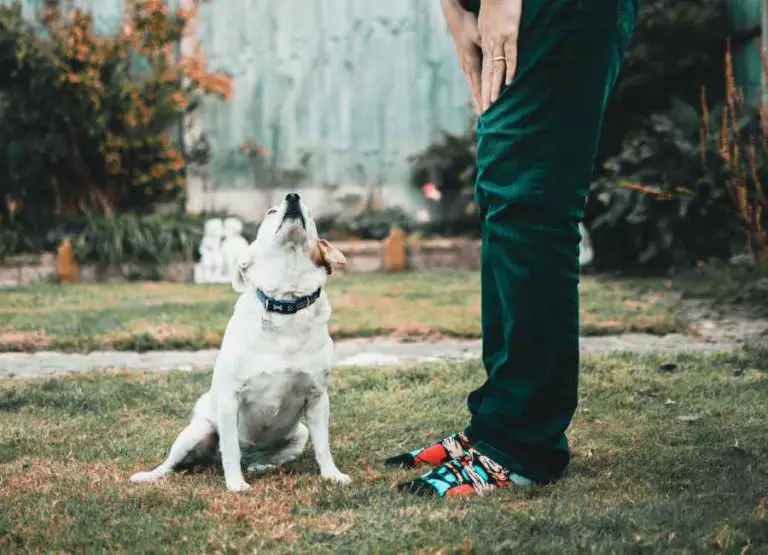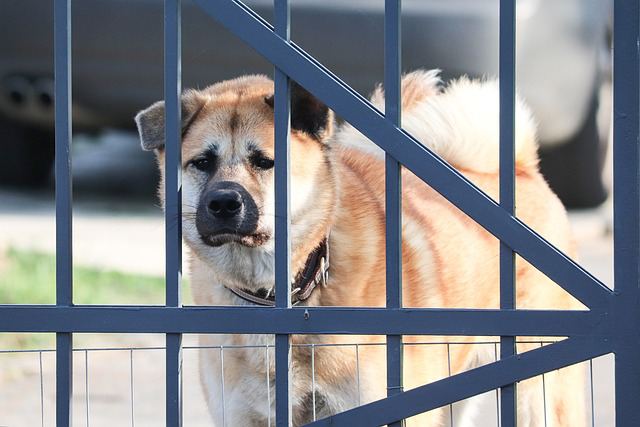Dog Begging for Food [How to Address Begging]
![Dog Begging for Food [How to Address Begging] Dog Begging for Food](https://petcreeks.com/wp-content/uploads/2023/09/pexels-samson-katt-5256134.jpg)
Hey there, fellow dog lovers! Today, let’s talk about a common struggle we all know too well: our dog begging for food.
We’ve all seen those adorable puppy eyes staring up at us, but how do we resist their pleas?
In this blog post, we’ll uncover the secrets to tackling this challenge with love and compassion. So, let’s dive in and learn how to keep those begging paws at bay!
Why Is My Dog Begging For Food
Your dog may be begging for food due to various reasons, such as hunger, learned behavior, or seeking attention.
Keep in mind that your dog’s begging can be reinforced if the dog has received food in the past when begging.
It is important to establish consistent rules and boundaries regarding feeding to discourage begging behavior and maintain a balanced diet for your dog.
Let’s take it a step further…
Reasons Your Dog is Begging for Food
![Dog Begging for Food [How to Address Begging] Reasons Your Dog is Begging for Food](https://petcreeks.com/wp-content/uploads/2023/09/pexels-samson-katt-5256135.jpg)
The following are some of the most common reasons why your dog is begging for food:
1. Your Dog is Hungry
If your dog is begging for food because they are hungry, it’s important to ensure that they are receiving an adequate and balanced diet.
Here are a few steps you can take to address this:
a) Feeding Schedule: Establish a consistent feeding schedule for your dog. Divide their daily food intake into multiple meals throughout the day. This will help regulate their hunger levels and prevent excessive begging.
b) Portion Control: Ensure that you are providing the correct portion size for your dog’s size, age, and activity level. Consult with your veterinarian to determine the appropriate amount of food to feed your dog.
c) High-Quality Food: Feed your dog a high-quality, nutritionally balanced dog food that meets their specific dietary needs. Avoid feeding them excessive table scraps or unhealthy human food, as this can contribute to weight gain and nutritional imbalances.
d) Treats and Rewards: If you use treats as rewards during training or for positive reinforcement, ensure that they are accounted for in your dog’s overall daily calorie intake. Use healthy, low-calorie treats, and avoid overindulging your dog with excessive treats.
2. Lack of Satiety
If your dog is begging for food due to a lack of satiety, it means they may not feel full or satisfied after eating.
Here’s how you can address this:
a) Fiber-Rich Diet: Ensure that your dog’s diet includes an adequate amount of fiber. Fiber can help promote feelings of fullness and prevent excessive hunger. Consult with your veterinarian to determine the appropriate amount of fiber for your dog’s diet.
b) Slow Feeding Methods: Consider using slow feeding methods such as puzzle feeders or interactive toys that require your dog to work for their food. This can help increase their mealtime duration and provide mental stimulation, which can contribute to a greater sense of satiety.
c) Food Enrichment: Add food toppers or mix-ins such as canned pumpkin or green beans to your dog’s meals. These low-calorie additions can help increase the volume of their food without significantly increasing their calorie intake, promoting a greater feeling of fullness.
3. Reward-seeking Behavior
If your dog is begging for food as a form of reward-seeking behavior, it’s important to address this in a consistent manner.
Here are some strategies to consider:
a) Ignore Begging Behaviors: Teach your dog that begging will not result in receiving food. Avoid giving in to their begging by ignoring their behavior and refraining from giving them any food from the table or during mealtime.
b) Redirect Attention: Provide alternative activities or toys to redirect your dog’s attention away from begging. Engage them in interactive play or provide puzzle toys to keep them mentally and physically stimulated.
c) Consistent Training: Implement consistent training techniques to teach your dog appropriate behaviors and commands, such as “sit” or “stay.” Reward them with praise, treats, or playtime for displaying desired behaviors instead of begging.
4. Reinforcement from Family Members
If your dog is begging for food due to reinforcement from family members, it’s important to establish consistent rules and boundaries.
Here’s how you can address this:
a) Family Communication: Ensure that all family members are on the same page regarding feeding rules and avoiding reinforcement of begging behaviors. Consistency is key in preventing your dog from receiving mixed signals.
b) No Table Scraps: Encourage family members to refrain from giving table scraps or food directly from their plates to the dog. Educate them on the potential negative effects of this behavior and the importance of sticking to the dog’s designated diet.
c) Alternative Rewards: Encourage family members to interact with the dog in non-food-related ways. Provide them with alternative ways to show affection and provide rewards, such as praise, petting, or playtime.
5. Food smells and tastes good
Dogs have a strong sense of smell and are naturally attracted to the aroma of food. If your dog is constantly begging for food, it may be because the smell and taste of human food are enticing to them. To address this reason, it’s important to establish boundaries and train your dog to have good manners around food.
Here are some tips:
- Avoid feeding your dog from the table: It’s important to discourage feeding your dog scraps or leftovers from the table. This can reinforce begging behavior and lead to unhealthy habits.
- Feed your dog in designated areas: Establish a specific feeding area for your dog and avoid feeding them in the same space where you eat. This helps create a clear distinction between human and dog food areas.
- Use positive reinforcement: Reward your dog for good behavior, such as sitting calmly or staying in their designated area during mealtime. This helps reinforce positive behavior and discourages begging.
6. Lack of Proper Training
If your dog hasn’t received proper training, they may resort to begging as a way to get what they want. Training your dog to have good manners around food can help address this issue.
Here’s what you can do:
- Teach basic obedience commands: Train your dog to follow basic commands such as “sit,” “stay,” and “leave it.” These commands can be useful in redirecting your dog’s attention away from begging and towards appropriate behavior.
- Establish a feeding routine: Set regular meal times for your dog and stick to a consistent schedule. This helps create structure and reduces the likelihood of begging.
- Use positive reinforcement: Reward your dog for demonstrating good behavior and following commands. This can include treats, praise, or playtime.
7. Not getting the right nutrients
Sometimes, dogs may beg for food because they aren’t getting the proper nutrients from their regular meals. Here’s how you can address this:
- Consult with a veterinarian: If you suspect that your dog’s begging behavior is due to nutritional deficiencies, it’s important to consult with a veterinarian. They can assess your dog’s diet and recommend any necessary changes or supplements.
- Provide a balanced diet: Ensure that your dog is receiving a balanced and nutritious diet that meets their specific needs. This may involve feeding them high-quality commercial dog food or preparing homemade meals with guidance from a veterinarian or a professional animal nutritionist.
Dogs that haven’t been properly socialized may resort to begging for food as a way to seek attention or to cope with anxiety. Here’s how you can address this:
- Socialize your dog: Gradually expose your dog to different environments, people, and animals to help them become more comfortable and confident. This can be done through controlled interactions, obedience classes, or supervised playdates.
- Provide mental stimulation: Engage your dog in activities that provide mental stimulation, such as puzzle toys, interactive games, or training sessions. This can help redirect their focus away from begging and towards more appropriate behaviors.
How to Stop a Dog Begging for Food
![Dog Begging for Food [How to Address Begging] How to Stop a Dog Begging for Food](https://petcreeks.com/wp-content/uploads/2023/09/pexels-samson-katt-5256140-1.jpg)
To stop a dog from begging for food, establish clear boundaries and consistently enforce them. Firstly, avoid giving in to the begging behavior, as this only reinforces it.
Instead, provide the dog with a designated eating area away from the dining table. Use positive reinforcement, rewarding the dog for staying in their designated spot during mealtime.
Let’s dig deeper…
To stop a dog from begging, there are several practical methods you can try:
- Establish a designated place: Teach your dog to go to a specific spot, such as a bed or a mat, when you’re eating. Use positive reinforcement to reward them for staying in that spot. This will redirect their attention away from begging and give them a clear alternative behavior.
- Ignore the begging: Dogs beg because they have learned that it can be rewarding. It’s important to consistently ignore their begging behavior. Avoid making eye contact, speaking to, or giving any attention or food to your dog while they are begging. Reinforce the idea that begging does not lead to any rewards.
- Practice the “leave it” command: Teach your dog the “leave it” command, which can be useful for redirecting their attention away from food. Start by holding a treat in your closed hand and saying “Leave it.” When your dog stops trying to get the treat, praise and reward them with a different treat. Repeat this exercise until your dog understands the command.
- Prevent access to the table: Use physical barriers or create a boundary to prevent your dog from accessing the table or the area where you eat. This can be done by using baby gates or closing doors. By limiting their access, you can prevent them from being reinforced by food scraps or attention while you’re eating.
- Feed your dog before meals: Make sure your dog is fed and has had a potty break before you sit down to eat. This can help reduce their motivation to beg for food.
- Provide alternative activities: Keep your dog entertained and occupied during mealtime by giving them a food puzzle toy, or a chew toy, or engaging them in interactive play. This can help redirect their focus and provide them with mental stimulation.
- Consistency and positive reinforcement: Be consistent in your approach and reinforce desired behaviors. Reward your dog with praise, treats, or attention when they exhibit the desired behavior of not begging. Consistency and positive reinforcement will help your dog understand what is expected of them.
- Send your dog to a designated spot: If your dog comes over to beg for food, send them to a cozy spot near the dining area. If your dog already knows a solid “Stay” command, use it. This ensures that your dog remains in the designated spot throughout the meal.
Preventing Your Dog Begging for Food
![Dog Begging for Food [How to Address Begging] Preventing Your Dog Begging for Food](https://petcreeks.com/wp-content/uploads/2023/09/pexels-samson-katt-5256142.jpg)
Preventing your dog from begging for food is an important behavior to establish in order to maintain a healthy and balanced relationship with your furry friend.
Here are the best ways to prevent your dog from begging for food:
- Consistency: Consistency is key when training your dog. Establish clear rules and boundaries regarding feeding and stick to them consistently.
- No table scraps: Make it a rule that your dog is never given food from the table, the sofa, or anywhere else that you eat. This helps to prevent the reinforcement of begging behavior.
- Ignore begging behavior: When your dog begs for food, it’s important not to give in to their demands. Instead, ignore the behavior and avoid rewarding it with attention or food.
- Feed on a schedule: Establish a regular feeding schedule for your dog. This helps them understand when to expect their meals and reduces the need for begging.
- Use puzzle toys: Provide your dog with puzzle toys or food-dispensing toys that require mental and physical stimulation to access the food. This helps to keep them occupied and reduces the desire to beg.
- Train an alternative behavior: Teach your dog an alternative behavior, such as sitting or lying down, when they want attention or food. Reward and reinforce this behavior instead of begging.
- Provide appropriate exercise: Ensure that your dog is getting enough physical exercise and mental stimulation throughout the day. A tired dog is less likely to beg for food out of boredom.
- Use positive reinforcement: Reward your dog with praise, treats, or affection when they exhibit good behavior, and refrain from begging for food. Positive reinforcement helps to reinforce desired behaviors.
- Enlist the help of the whole family: It’s important that everyone in the household is on board with preventing begging behavior. Consistency and cooperation from all family members will help reinforce the training and prevent any unintentional reinforcement of begging.
Remember, patience and consistency are key when training your dog. By following these ways to prevent begging for food, you can establish healthy boundaries and reinforce positive behaviors in your furry friend.
Frequently Asked Questions
Is it okay to give in to my dog’s begging?
While it may be tempting to give in to your furry friend’s puppy eyes, it’s important to establish boundaries. Constantly giving in to begging can lead to obesity, digestive issues, and behavioral problems in dogs. It’s best to stick to a regular feeding schedule and provide your dog with appropriate treats.
How can I discourage my dog from begging?
To discourage begging behavior, consistency is key. Avoid giving your dog food from the table or when they beg. Instead, provide them with their own designated feeding area and reward them for good behavior. Teaching them basic commands like “stay” and “leave it” can also be helpful.
What if my dog continues to beg despite my efforts?
If your dog persists in begging, it’s essential to remain patient and consistent with your training. Consider consulting a professional dog trainer or behaviorist who can provide guidance tailored to your specific situation. They can help you address any underlying issues contributing to the begging behavior.
Are there any health concerns associated with dogs begging for food?
Yes, there can be health concerns related to dogs begging for food. Some human foods can be toxic or harmful to dogs, such as chocolate, onions, garlic, and grapes. Additionally, excessive begging can lead to weight gain and digestive problems. It’s important to provide your dog with a balanced diet and avoid sharing your food with them.
Can I give my dog any alternative treats to satisfy their begging behavior?
Absolutely! Instead of giving in to your dog’s begging, you can offer them healthy alternatives. Consider giving them dog-friendly treats like carrots, green beans, or small pieces of cooked chicken or turkey. These options can help satisfy their desire for food without compromising their health. Remember to consult with your veterinarian about suitable treats for your specific dog.
Read more about dog training mistakes to avoid.
Conclusion
So, the next time your furry friend gives you those pleading puppy eyes at the dinner table, remember this: while it may be tempting to give in, feeding your dog from the table can lead to unwanted behaviors and health issues.
Instead, focus on providing a balanced and nutritious diet tailored to their needs, and show them love and attention in other ways. Your pup will thank you for it in the long run!



![New Puppy Crying In Crate At Night [Tips] New Puppy Crying In Crate At Night](https://petcreeks.com/wp-content/uploads/2023/02/New-Puppy-Crying-In-Crate-At-Night-768x555.jpg)


